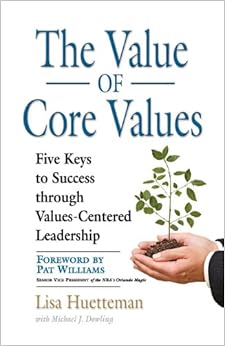Friend and fellow consultant and business coach Lisa Huetteman has written a wonderful book on a topic that is often discussed and focused on in business but rarely dealt with  effectively. When my signed copy arrived I couldn’t wait to read it! The Value of Core Values, subtitled "Five Keys to Success Through Values-Centered Leadership," creates a positive and actionable approach to core values at a time when we have a values crisis in our country… evidenced by headlines that continue to capture shipwrecked careers and discredited companies.
effectively. When my signed copy arrived I couldn’t wait to read it! The Value of Core Values, subtitled "Five Keys to Success Through Values-Centered Leadership," creates a positive and actionable approach to core values at a time when we have a values crisis in our country… evidenced by headlines that continue to capture shipwrecked careers and discredited companies.
Lisa contends that these sensational stories are merely the tip of the iceberg and that "thousands of other companies are suffering from expensive, time-consuming, and energy-draining problems with customers, employees, subcontractors and vendors because they either haven’t defined core values or they try to take shortcuts around them."
If strategies describe what the organization is going to do, then core values define how the organization is going to do it.
To have value, core values must be described in behavioral terms within the context of the organization’s mission and vision. Decisions that are made every day by everyone in the company need to not only meet the requirements of "Is it legal?" and "Is it ethical?" but also "Does it honor our core values?" If those core values have not been defined and consistently "lived," then it is impossible to ensure that deviations won’t occur.
In addition to providing a compelling argument for the value of core values, Lisa outlines five principles that are the keys to achieving organizational success through values-centered leadership. These principles are supported by stories of companies that in living their core values have achieved high levels of success, proving that core values are essential to, not in conflict with, business profitability and sustainability.
Five Keys to Success Through Values-Centered Leadership
# 1: Owning your values – Your personal and organizational values should be an expression of who you are at your core. It’s one thing to "have" values; it’s another to "own" them. If you’re not committed to them, no one else will be.
- All values begin at the individual level. When personal and organizational values are misaligned, both the individual and the organization suffer.
- Organizational responsibility starts with personal commitment. The individuals within the organization must be willing to be held accountable to the organization’s core values, and they must be willing to hold others accountable to them as well.
# 2: Defining core values – You must give meaning to your chosen values by creating clear definitions so everyone concerned understands what behaviors they advocate and forbid. Defining values is a two-step process:
- First, the foundational principles that will define the organization’s relationships with it customers, employees, suppliers, partners, and other stakeholders must be identified. These principles are the core values.
- Second, the chosen core values must be described in the context of the business’ daily life such as the hiring process, customer service, sales, and employee performance evaluations.
# 3: Sharing core values – You need to communicate your core values constantly and consistently so that everyone in the organization understands and owns them.
- A half-hearted attempt to promote core values is not just ineffective; it’s detrimental. When you don’t share them, the message comes through loud and clear that they’re unimportant and irrelevant.
- Promoting core values internally is only one side of the coin. Sharing them externally establishes the firm’s identity and reputation, and it helps to attract customers, vendors, and other resources who share the organization’s values.
# 4: Institutionalizing your values – You must weave your values into the fabric of your organization so they influence all actions and decisions.
- Core values need supportive infrastructure in order to thrive. If you don’t integrate them into your company’s operations they will have little sustained impact.
- Organizations that gain the most from core values refer to them when hiring and training people, selecting vendors, setting goals, developing marketing strategies, purchasing goods and services, and approving projects and budgets.
# 5: Honoring core values – You must regard your company’s core values as non-negotiable or they will become inconsequential.
- Actions speak louder than words. To be authentic, core values must be lived.
- Honoring core values is both the easiest and the most difficult thing a values-centered leader will be called upon to do. It’s easy because values simplify decision making by clarifying right from wrong. It’s difficult because honoring values demands courage and conviction, when we may naturally gravitate toward convenience and compromise.
Living by core values won’t exempt you from economic downturns, troublesome personnel issues, unreasonable customers, or other challenges. But you will be more likely to prosper because you will be operating within a solid framework of right priorities.
Lisa, congratulations on a terrific book and thank you for sharing it with us. My hope is that we all rise to your challenge to live our core values, at home and at work.
